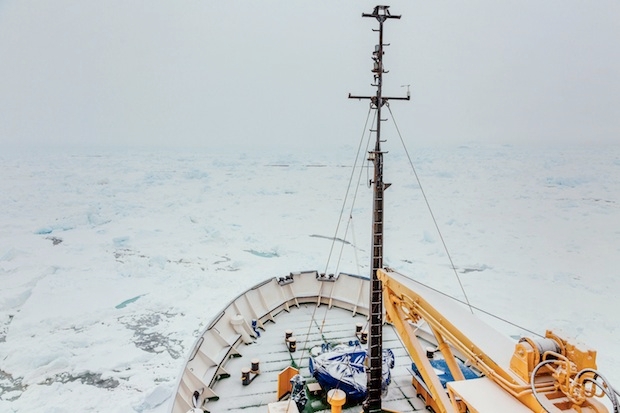As Chris Turney and his colleagues make their way home from their failed adventure, the next question is: who is going to be paying for their folly? It certainly isn’t the general public. The efforts by Turney and his co-leader Chris Fogwill to crowd-fund money have been an embarrassing failure. They were seeking to raise $49,000 in this way – a small fraction of the $1.5 million overall costs – but they managed to raise a mere $1,000 from 22 people. Not even the promise of a signed copy of Turney’s book, 1912: the year the World Discovered Antarctica was enough to tempt donors into action: not a single one chose to receive the book.
British taxpayers, needless to say, have dipped in their toes. One of the sponsors is the University of Exeter, Professor Turney’s previous employer. The university is fast on its way to taking over from the University of East Anglia as the global warming lobby’s chief mouthpiece. Universities claim to have fallen on hard times but there seems to be no lack of money when it comes to broadcasting the global warming lobby’s case: Exeter has just launched a ‘massive open online course’ on climate change which the public are all invited to sign up – all for free. I don’t think I would be pleased about that if I was paying £9,000-a-year tuition fees for one of Exeter’s other course.
Another question that needs to be asked about Turney’s expedition is how come the only journalists aboard are from the Guardian, which has sent two reporters, the BBC and Radio New Zealand – all eager mouthpieces of the global warming lobby. I would be fascinated to know if anyone else was invited.
The timing of the publication of a paper by Turney’s current employer, the University of New South Wales, is also fascinating. That appeared in Nature on 1 January, claiming that current climate models under-estimate the level of warming, which could reach 4C by 2100.
As I noted here on Thursday, as the world fails to warm, the greater faith seems to be put into faulty climate models which so far have proved wrong in many respects – among them predicting ever hotter and drier summers for the UK, the exact opposite of the trend of the past decade. As a sign of just how far the climate debate has veered away from genuine science into ideological nonsense, have a look at this quote:
‘In sum, a strategy must recognise what is possible. In climate research and modelling, we should recognise that we are dealing with a coupled non-linear chaotic system, and therefore that the long-term prediction of future climate states is not possible.’
Any ideas where it comes from? The IPCC report of 2001, when that body still recognised that predictions of the sort made by Turney’s colleagues are fantasy.







Comments